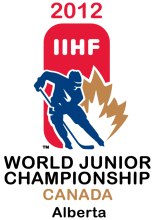CALGARY – There’s something very strange about the list of players who have recorded the highest single-game point totals in World Junior history: none of them went on to win the gold medal at the tournaments where they accomplished their feats.
Although Russian captain Yevgeni Kuznetsov probably didn’t lose any sleep over this fact after racking up three goals and six assists in a 14-0 crushing of Latvia on December 29, maybe he should have.
Look at page 344 of the
2012 IIHF Guide & Record Book, and you’ll see some of the greatest names in hockey history, as well as some lesser lights, under “Most Points, One Game”.
There’s Sweden’s Peter Forsberg, of course, who set the all-time record with three goals and seven assists in a 20-1 walloping of Japan 19 years ago (December 30, 1992). But the legendary “Foppa” didn’t come away with the gold medal at that 1993 tournament on home ice in Gävle. Even though Tre Kronor had a stacked, favoured roster featuring Forsberg, Markus Näslund, Niklas Sundström, and Kenny Jönsson, among others, they settled for silver behind Canada.
Ola Rosander, a lesser-known Swedish forward, holds second place on the list for his six goals (another tournament record) and two assists in a 13-0 romp over Poland (December 28, 1987). Yet the Södertälje SK journeyman didn’t have anything to celebrate when these World Juniors wrapped up in Moscow: Sweden placed fifth.
The Record Book then names twelve players who registered seven-point games – and after Russia’s pounding of Latvia, you can add Nikita Gusev (two goals, five assists) to that list.
Prior to this year’s tournament, Canada’s Gabriel Bourque, who just made his NHL debut with Nashville, was the most recent visitor to seventh heaven, notching three goals and four assists in a 16-0 win over Latvia (December 26, 2009). But his tangible legacy from the tournament in Saskatchewan was a silver medal after the USA edged Canada 6-5 in overtime in the gold medal game.
Ask fellow members of the “Seven Club” like Doug Weight, Alexander Mogilny, Dave Andreychuk, and Jari Kurri whether they’d happily trade in their one-game outbursts for a gold medal at those tournaments, and the answer across the board would be “Yes!”
So is it bad for an individual player to fill the net against lower-echelon nations? Not from the traditional, conservative Canadian perspective of “Don’t run up the score – it’s not classy,” but from the point of view of “Does this ultimately help my team win the championship?”
It’s impossible to establish a direct, causal connection between one player’s scoring seven or more points in a game against, say, Poland or Norway and his team’s failure to claim gold. (And of course, goal differential counts for seeding in IIHF tournaments.)
But it’s also impossible to deny that putting up such enormous numbers can send the wrong psychological message to both the individual and his team. It’s different from the confidence boost you get from, say, earning three points in a win over a medal contender.
Sure, World Junior players will say the right things afterwards, as Kuznetsov did. That they know it’s a team game. That they have tough opponents coming up. That they’ll need to stay focused.
Yet mentally and emotionally – and remember, we’re still dealing with teenagers here, regardless of how marvelous their hockey skills are and how good their intentions are – it can be very hard for them to avoid feeling at some level: “I’m the greatest. Nobody can stop me. Scoring is easy. And winning this tournament will be easy too.”
Sometimes, that involuntary underlying arrogance comes back to haunt the scoring-spree sensation when he can’t generate a big goal in a big game later on. It’s almost as if he had a finite number of points allocated to him before the tournament began, but used them up too quickly.
So what will become of Yevgeni Kuznetsov?
Kuznetsov is a magnificent talent. The Traktor Chelyabinsk forward’s dynamic style is reminiscent of Yevgeni Malkin. He will likely be a significant player for Russia at the 2014 Sochi Olympics.
Captaining the defending World Junior champions, the 19-year-old certainly seems like he could buck the trend and win gold, unlike those other gentlemen we mentioned on page 344.
But will he? Here in Calgary, we’re soon going to find out if Kuznetsov wishes he’d “saved some points for later”.
LUCAS AYKROYD







